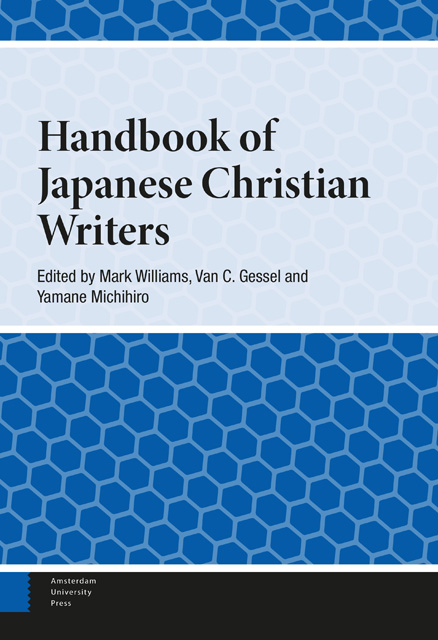Book contents
- Frontmatter
- Contents
- Contributors
- Abbreviations
- Preface
- Introduction
- 1 Prophet of the Inner Life: Kitamura Tōkoku
- 2 Shimazaki Tōson and Christianity: When the Cherries Ripen in the Taishō Period
- 3 Arishima Takeo and Christianity
- 4 Akutagawa Ryūnosuke: A Christian Life
- 5 Incarnation of the Christian Faith in the Poetry of Yagi Jūkichi
- 6 Hori Tatsuo: The Cross Dyed in Bloody Red and the Little Gods of Ancient Times
- 7 Nagai Takashi on Divine Providence and Christian Self-Surrender: Towards a New Understanding of hansai
- 8 Dazai Osamu: His Wrestle with the Bible
- 9 Shiina Rinzō: His Two Visages
- 10 From out of the Depths: Shimao Toshio’s Literary Response to Adversity
- 11 Yasuoka Shōtarō and Christianity: From Postwar “Emptiness” to Religious Longing
- 12 Miura Ayako and the Human Face of Faith
- 13 Endō Shūsaku and the Compassionate Companionship of Christ
- 14 Ogawa Kunio: Renewal of Faith and Identity in His seishomono (Bible Stories)
- 15 Kaga Otohiko: In Search of What Lies Beyond Death
- 16 Sono Ayako: Amor Vincit Omnia
- 17 Takahashi Takako: Drawing Closer to God Through Literature
- Index
- Index of titles
5 - Incarnation of the Christian Faith in the Poetry of Yagi Jūkichi
Published online by Cambridge University Press: 09 June 2023
- Frontmatter
- Contents
- Contributors
- Abbreviations
- Preface
- Introduction
- 1 Prophet of the Inner Life: Kitamura Tōkoku
- 2 Shimazaki Tōson and Christianity: When the Cherries Ripen in the Taishō Period
- 3 Arishima Takeo and Christianity
- 4 Akutagawa Ryūnosuke: A Christian Life
- 5 Incarnation of the Christian Faith in the Poetry of Yagi Jūkichi
- 6 Hori Tatsuo: The Cross Dyed in Bloody Red and the Little Gods of Ancient Times
- 7 Nagai Takashi on Divine Providence and Christian Self-Surrender: Towards a New Understanding of hansai
- 8 Dazai Osamu: His Wrestle with the Bible
- 9 Shiina Rinzō: His Two Visages
- 10 From out of the Depths: Shimao Toshio’s Literary Response to Adversity
- 11 Yasuoka Shōtarō and Christianity: From Postwar “Emptiness” to Religious Longing
- 12 Miura Ayako and the Human Face of Faith
- 13 Endō Shūsaku and the Compassionate Companionship of Christ
- 14 Ogawa Kunio: Renewal of Faith and Identity in His seishomono (Bible Stories)
- 15 Kaga Otohiko: In Search of What Lies Beyond Death
- 16 Sono Ayako: Amor Vincit Omnia
- 17 Takahashi Takako: Drawing Closer to God Through Literature
- Index
- Index of titles
Summary
A representative Japanese poet, Yagi Jūkichi, succeeded in overcoming the vision of a paternal god that caused so many of his peers in the literary world to renounce the faith, and to create for himself a poetic world that represents the embodiment of a faith rooted in a maternal vision of God. Elements of his faith are reflected in his poems, through which the characteristics of this unique form of Christianity took root, and blossomed, in the hearts of the Japanese.
Introduction
The vast majority of Japanese literary figures since the Meiji period (1868–1912) who came under the influence of Christianity as youths ended up renouncing their Christian affiliation and devoting themselves to literature before they were in a position to give full expression to their faith. As an exception to this generalization, however, one can cite the figure of Yagi Jūkichi (1898–1927), whose poetry was born of his desire to give full expression to his faith. In his Preface to a collection of Yagi's poetry, the renowned sculptor and poet, Takamura Kōtarō, wrote as follows:
The poems of Yagi Jūkichi are eternal. Such pure and heart-wrenching poetry will never die, regardless of the age. And no matter how poetic techniques may change with the times, Yagi's poems will surely continue to strike at the heart of those who live and read them. … Those who read these quiet poems will find themselves visibly moved; those who read these gentle poems will be infused with an unquenchable power; they will find themselves feeling as though imbued with an infinite warmth derived from these innocent words. (Takamura 1984, 124)
And just as Takamura had predicted, even today, more than ninety years after Yagi's death, his poetry is still loved by many and continues to bring relief to the parched souls of so many in contemporary society.
It was the poet, Kusano Shinpei, who noted the presence of this power in Yagi's poetry when he remarked:
When it comes to Christian poetry in Japan, I think Yagi Jūkichi's is the best. He is by no means the first in this regard, but all the earlier examples were overly conceptual and give voice to little more than secular reasoning and simple emotions. It is as if the most important poetic element is missing from such poetry.
- Type
- Chapter
- Information
- Handbook of Japanese Christian Writers , pp. 84 - 98Publisher: Amsterdam University PressPrint publication year: 2022

